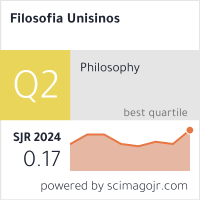Aristotle on pre-Platonic theories of sense-perception and knowledge
DOI:
https://doi.org/10.4013/4648Resumen
This paper is an attempt to make sense of Aristotle’s polemic –and, if taken at face value, quite evidently wrong– contention that the ancient thinkers globally failed to distinguish thought and knowledge from sensation. As I will try to show, what these thinkers missed, in Aristotle’s view, was his own concept of intellect (noûs) as a distinct mental faculty correlative to forms (eide). Lacking a concept of “forms” (formal and final causes), pre-Platonic thinkers, as Aristotle understands them, could conceive cognitive processes only as “alterations,” i.e. at a merely physical level of description, which made them unable to account for the difference between truth and error: by this failure, Aristotle argues in Met. ? 5, they unwittingly prepared the way for Protagorean relativism. This reconstruction will permit us also to have a more coherent understanding of some of Aristotle’s criticisms of Parmenides and Melissus; finally, I will shortly point out some analogies and differences between Aristotle’s theory of cognition and functionalist theories in contemporary philosophy of mind.
Key words: Aristotle, Presocratics, theory of knowledge, sense-perception, relativism, Parmenides, philosophy of mind.
Descargas
Métricas
Descargas
Publicado
Cómo citar
Número
Sección
Licencia
Concedo a revista Filosofia Unisinos – Unisinos Journal of Philosophy o direito de primeira publicação da versão revisada do meu artigo, licenciado sob a Licença Creative Commons Attribution 4.0 (que permite o compartilhamento do trabalho com reconhecimento da autoria e publicação inicial nesta revista).
Afirmo ainda que meu artigo não está sendo submetido a outra publicação e não foi publicado na íntegra em outro periódico e assumo total responsabilidade por sua originalidade, podendo incidir sobre mim eventuais encargos decorrentes de reivindicação, por parte de terceiros, em relação à autoria do mesmo.










